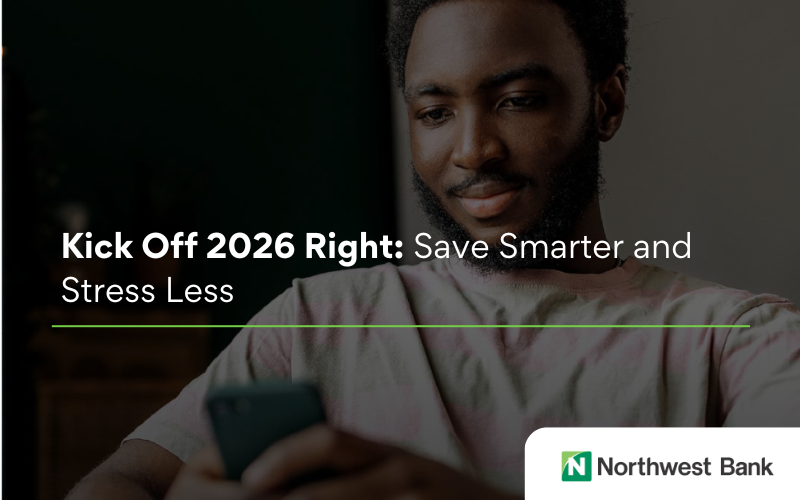Building Strong Financial Habits as a Teenager
Whether you’re eyeing a new car or the latest Fortnite skin, financial planning helps give you the independence to reach your goals.
Key takeaways:
-
Learning how to manage your money comes with some serious advantages, even if you don’t have rent and bills.
-
The best way to start is by understanding bank accounts and how to grow your savings with interest.
-
There are plenty of resources to help you manage your money, including your family, school and your neighborhood bank.
Between school, extracurriculars and your social life, managing your money might not be your top priority. That’s totally fine — trust us, there’s plenty of time for that later — but developing some smart financial habits can improve almost every aspect of your life.
Why should you care about money management in your teens?
Usually, when people talk about the benefits of financial planning, they’re talking about milestones that are years and decades in the making, like buying a home, planning a wedding or even retiring with financial security.
But the truth is that being smart with your money can also benefit your life right now.
That’s because money helps you gain independence. Having your own money means you don’t have to ask for your parents’ debit card to go shopping with your friends — you get to decide how (and where) to spend your cash.
Getting in the habit of saving can also significantly improve your life in the coming years. Those extra dollars you stash away can grow into the down payment for a car — or, at least, a gas money fund for when you use your parents’ car. Your savings can also help you go on that graduation trip you’re planning with your friends. And it also helps you cover the cost of college, so you don’t need to borrow quite as much.
Then there’s the social capital. Being ahead of the curve on money management means your friends will look to you for help managing their money. So not only can you make your life better, you can help out your friends, too.
The best way to start is with the basics: Understanding bank accounts
Even if your TikTok feed is full of financial influencers, the best way to build wealth is by learning the fundamentals. Unfortunately, you can’t trust that influencers actually know what they’re talking about — or that they’re not just trying to sell you their latest ebook or course.
As you start learning to manage your money, focus on learning about the different types of accounts and how they work. Generally, bank accounts fall into two categories:
Checking accounts
Checking accounts are your everyday bank account. They’re where you keep the money you plan to spend in your everyday transactions — and, later on, your rent and bills. When you get a job, this is also typically the account where you’ll deposit your paycheck.
Savings accounts
As you can probably guess, savings accounts are for saving money. You’ll earn interest on the money you store in a savings account. In other words, your bank will pay you a percentage of your savings each month as your “reward” for storing savings in your account.
- Learn more: What Kind of Bank Account Should You Choose?
Compound interest: Your best friend to building savings
One reason savings accounts are a great tool to build wealth is their ability to generate compound interest. Compound interest is easiest to understand by looking at an example.
Let’s say you deposit $100 in a savings account that pays an annual interest rate of 2%. At the end of one year, you’ll have earned $2 in interest, and you’ll have $102 total.
The next year, you’ll earn interest on the $102 in your account, instead of the $100 you originally deposited. That means you’ll earn slightly more than $2 in interest in your second year — and you’ll keep earning more and more interest with each subsequent year that you keep the money in your account.
Compound interest can add up to a big difference over time
Here’s another example. You deposit $100 in your savings account when you enter high school, and contribute $10 to your account each month for the next four years.
By the time you graduate from high school, you’d have about $610 in your savings account — even though you would have deposited $580. In other words, you just got $30 in free money.
Think of compound interest like a snowball rolling downhill: The longer you save, the faster you’ll earn interest. Here’s how your savings could grow over time:
|
Timeframe |
Amount deposited |
Account balance |
Interest earned |
|
8 years |
$1,060 |
$1,157 |
$97 |
|
12 years |
$1,540 |
$1,753 |
$213 |
|
16 years |
$2,020 |
$2,398 |
$378 |
Learning to navigate income tax
Once you get your first job, you’ll also need to learn some essentials on how taxes work.
There’s a difference between how much your employer pays you and how much of your pay you’ll actually take home. Payroll deductions, including income tax, typically automatically come out of your pay. So don’t worry if your first paycheck is a bit lower than you expected — that’s normal.
Thankfully, you’ll pay lower rates than adults. And if you earn less than $14,600 annually, you may be able to file a tax return and get a refund for some (or all) of the taxes you paid.
How to get help managing your money
We know: It’s a lot to take in. But there are plenty of opportunities to help manage your finances.
Ask older family members
Step one is to get help from your loved ones — whether that’s your parents, your aunts or uncles, an adult sibling or a trusted family friend. Ask how they got started managing their money, and if they have any advice to help you start building solid financial habits.
Talk to your teachers
Your school might also have resources to help you manage your money. Ask your guidance counsellor if your school offers a financial planning course, or if they have resources available to help you.
Find a financial institution
The staff at your local bank are always here to help. Most financial institutions offer checking and savings accounts designed with teens in mind, and they can also help you learn how to bank online or via mobile app.
Ask your parents if you can stop by your local Northwest financial center as a family. We can help you set goals, open the right bank accounts and answer your financial questions. The best part? It’s free.




